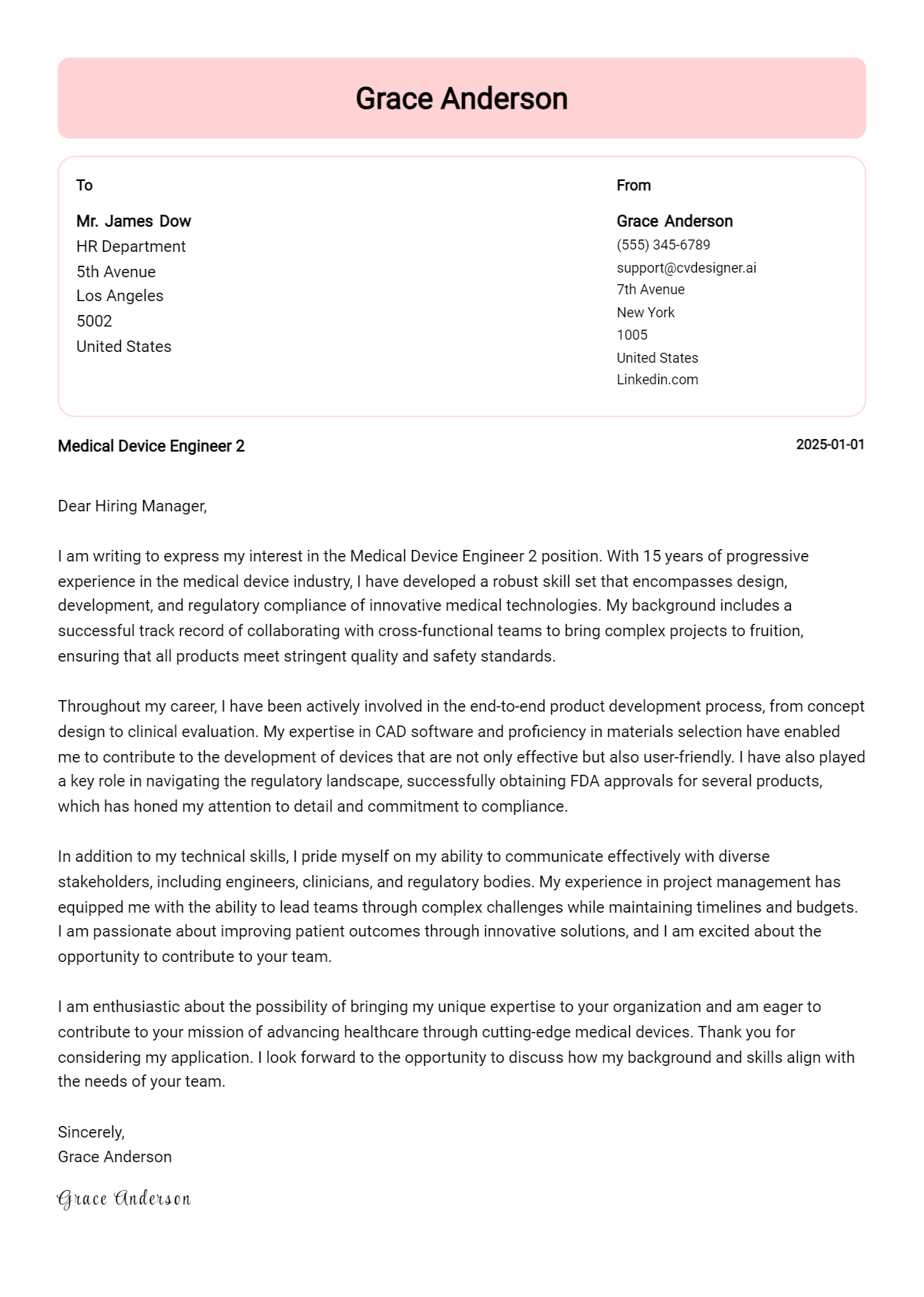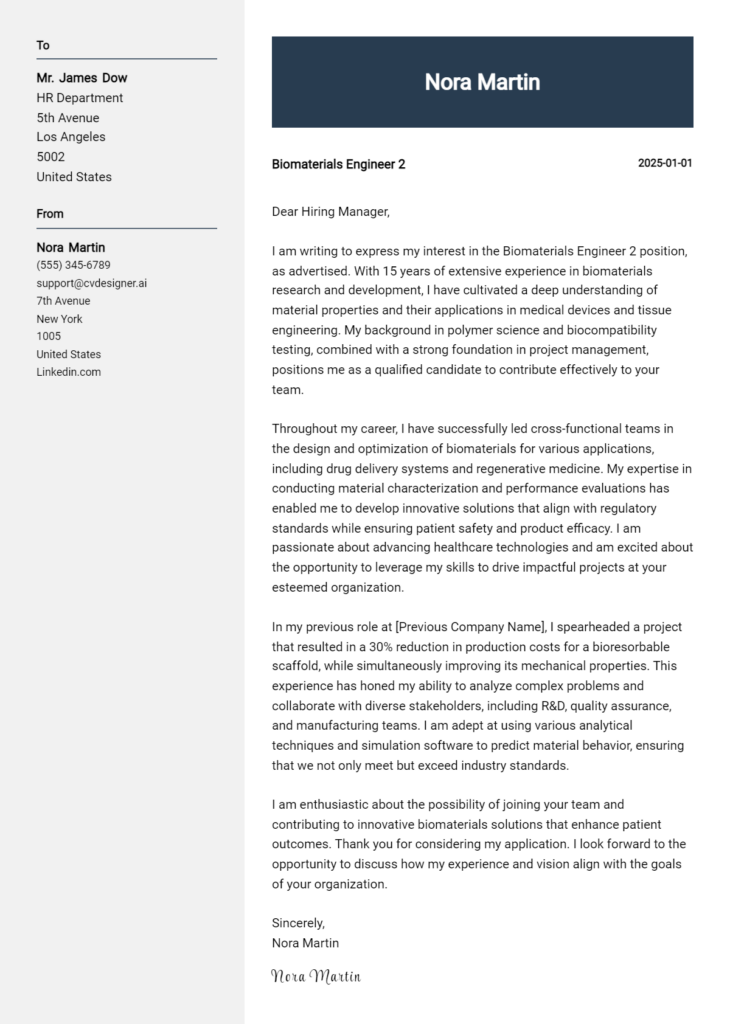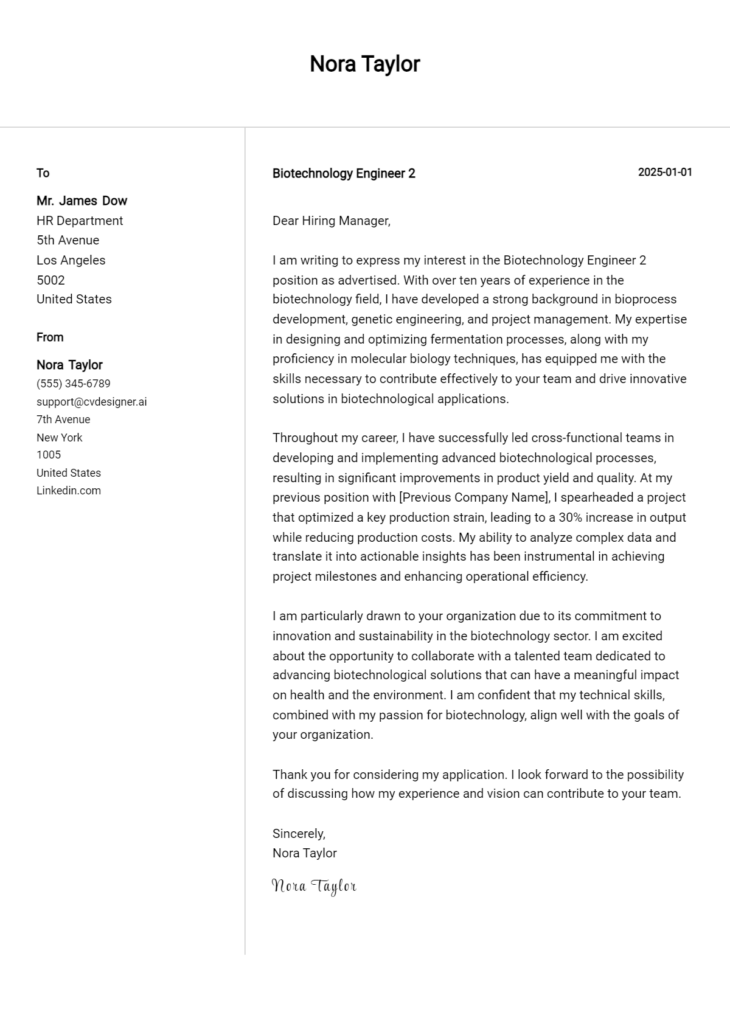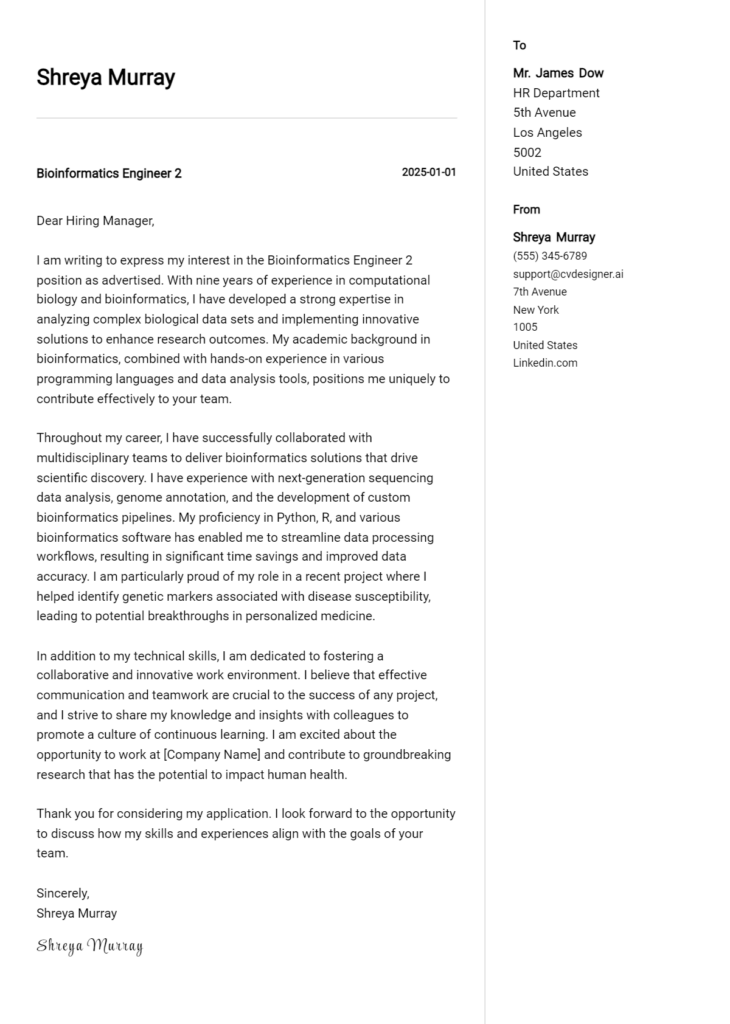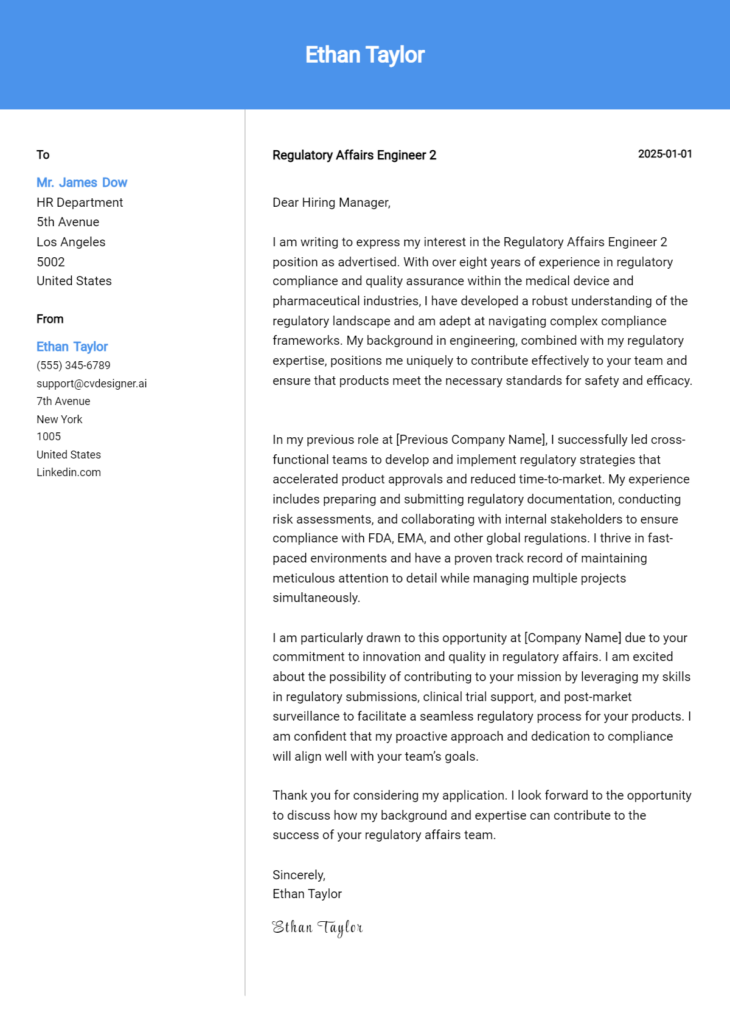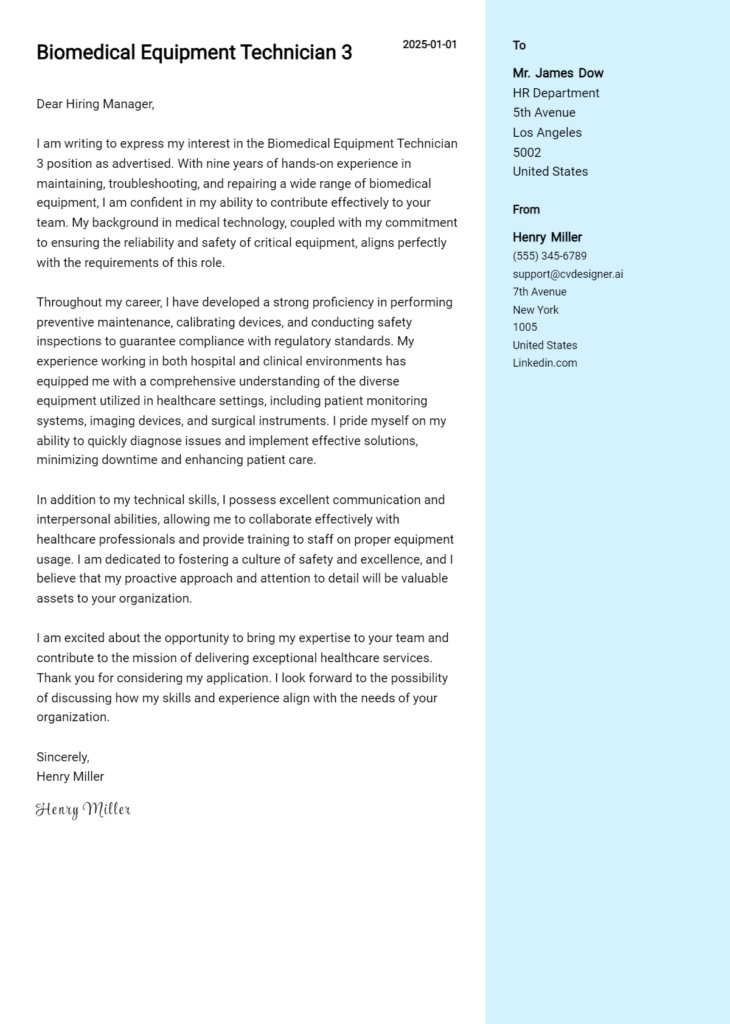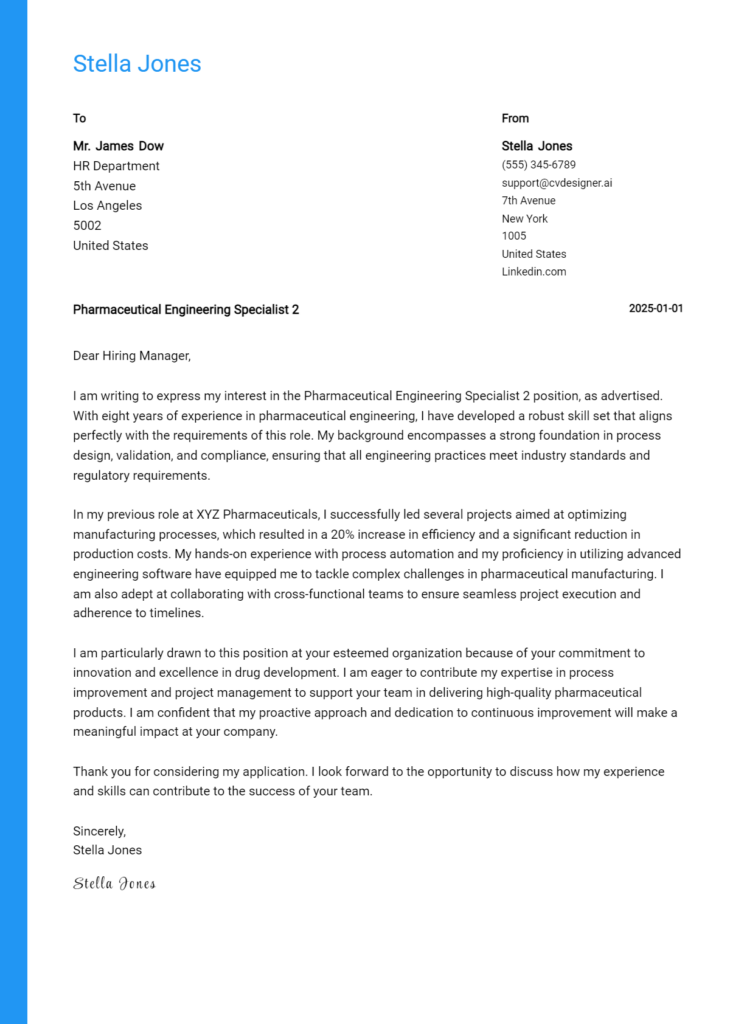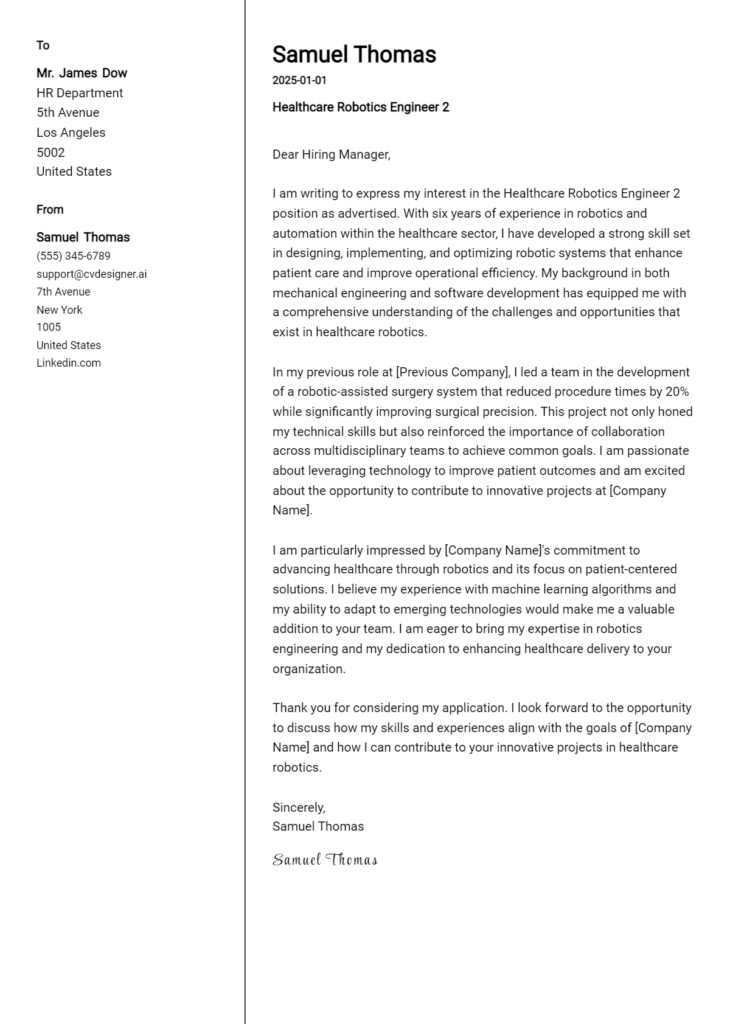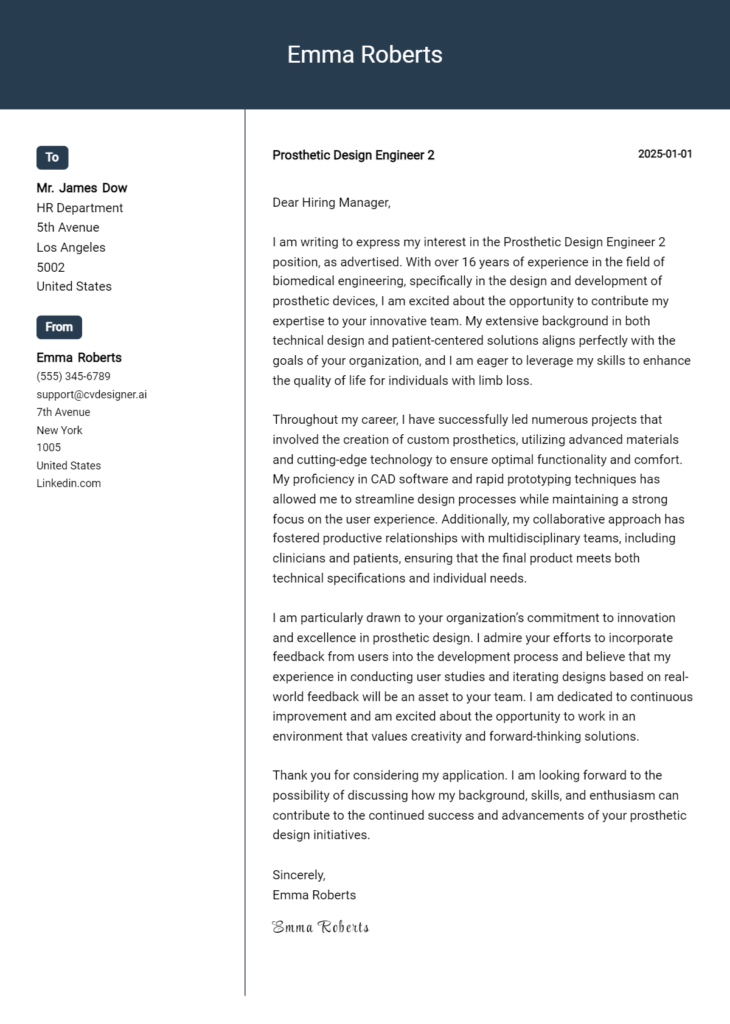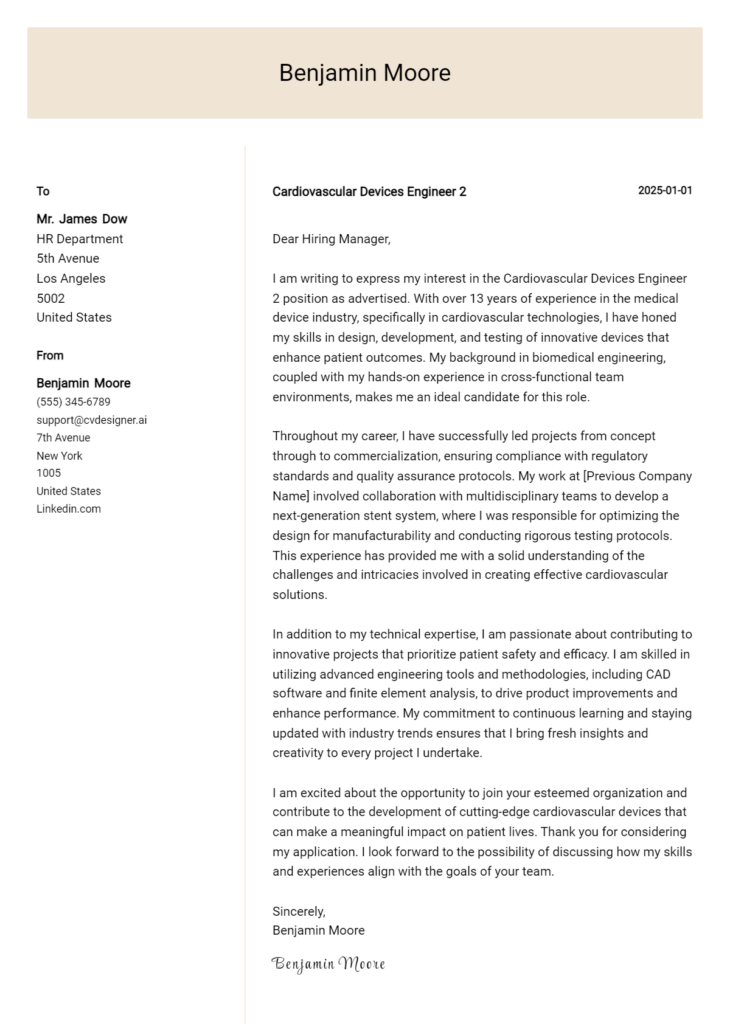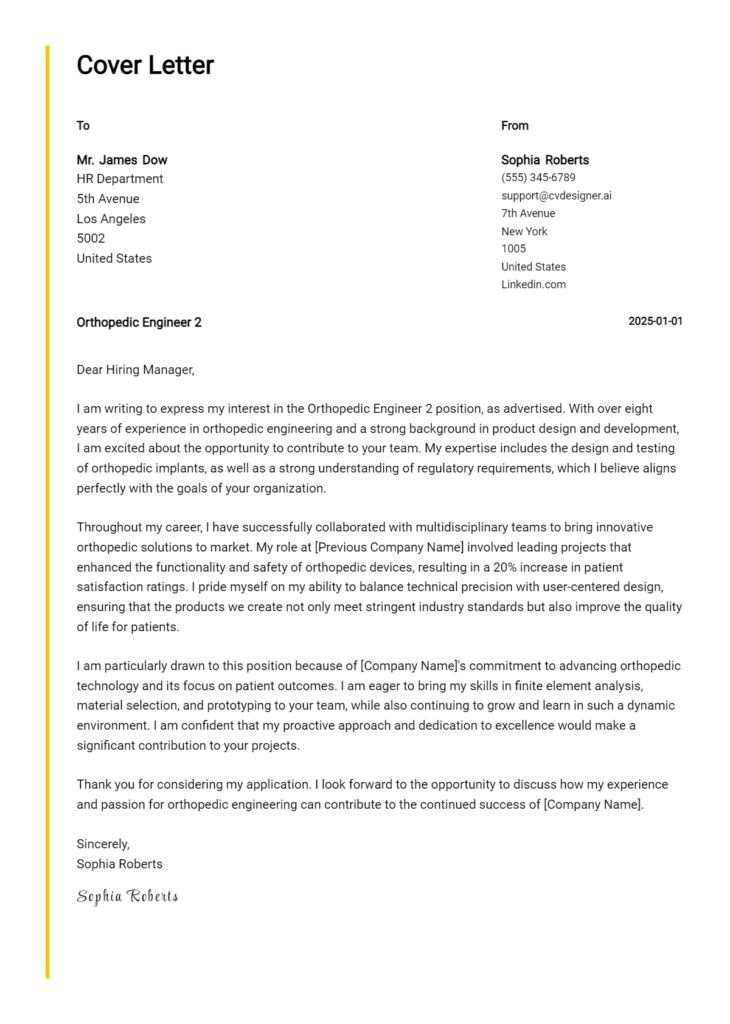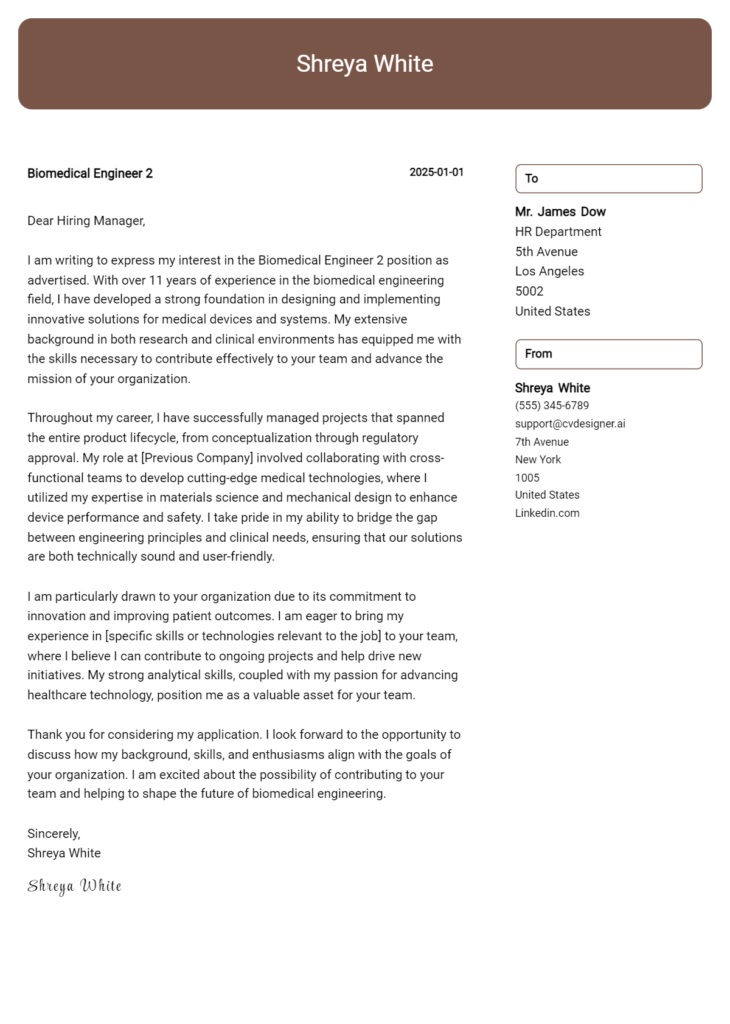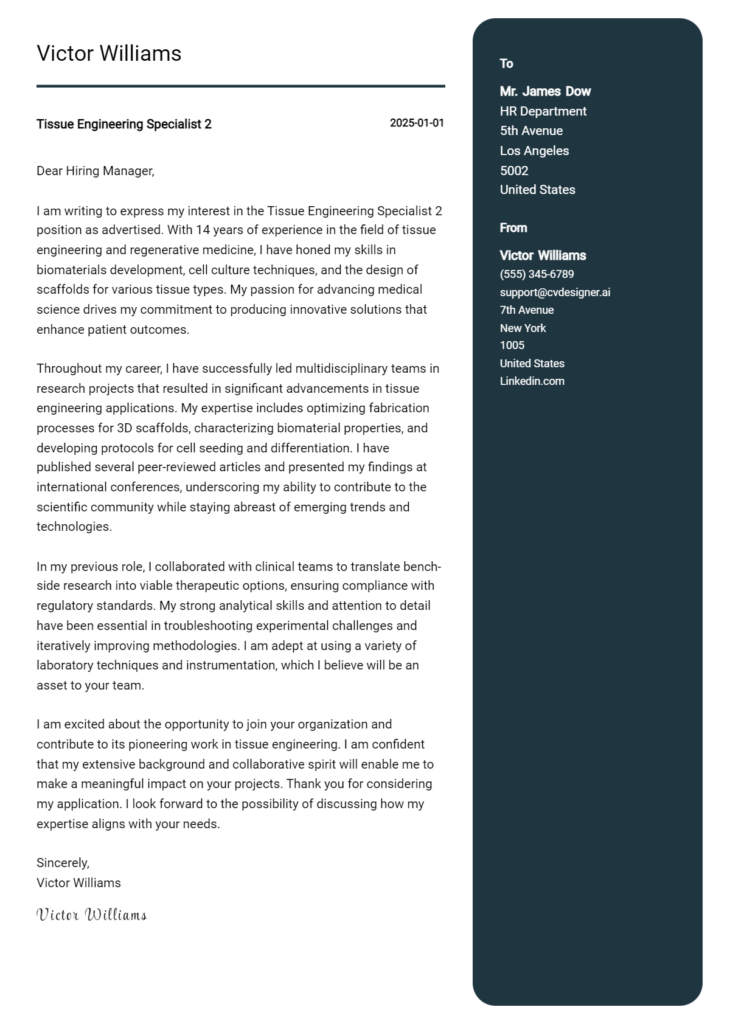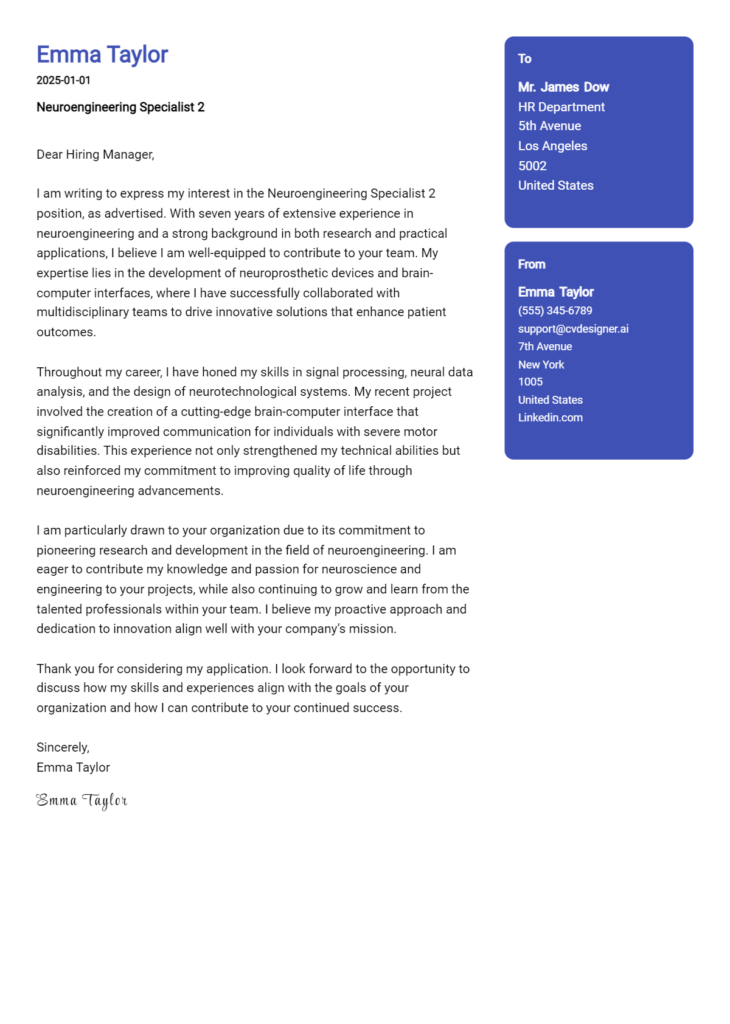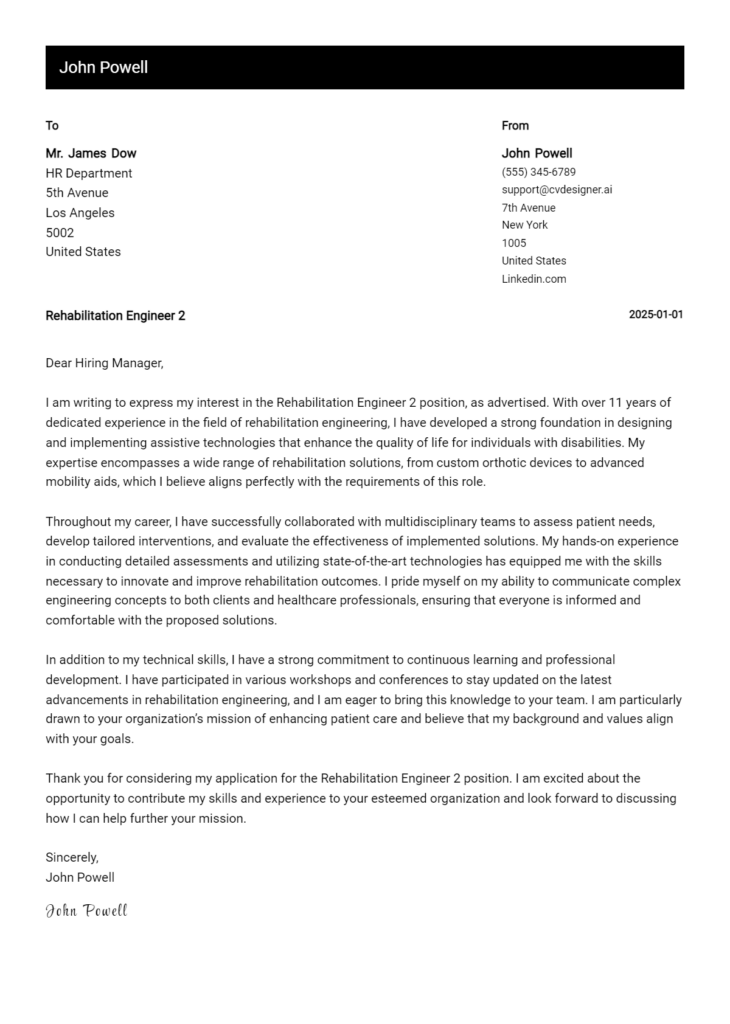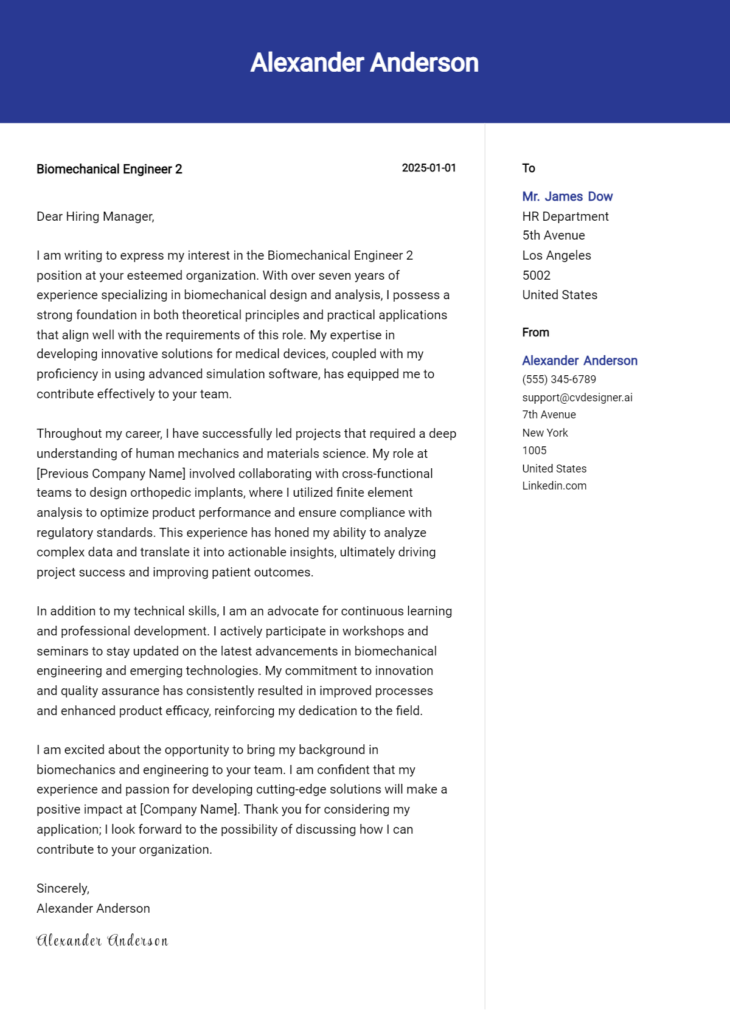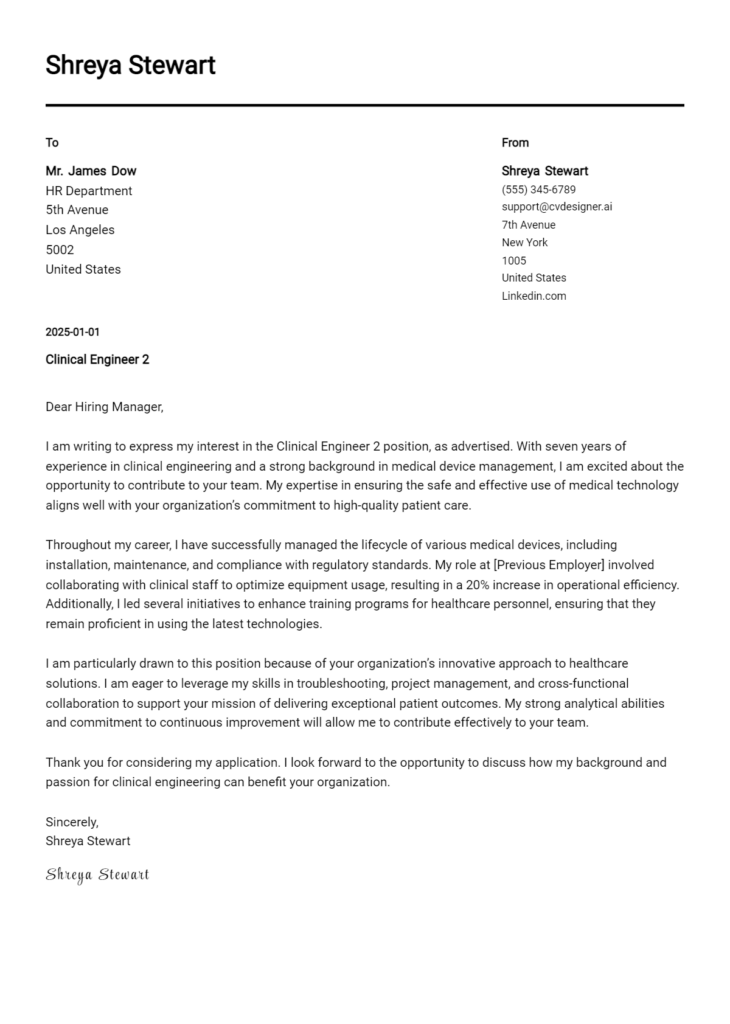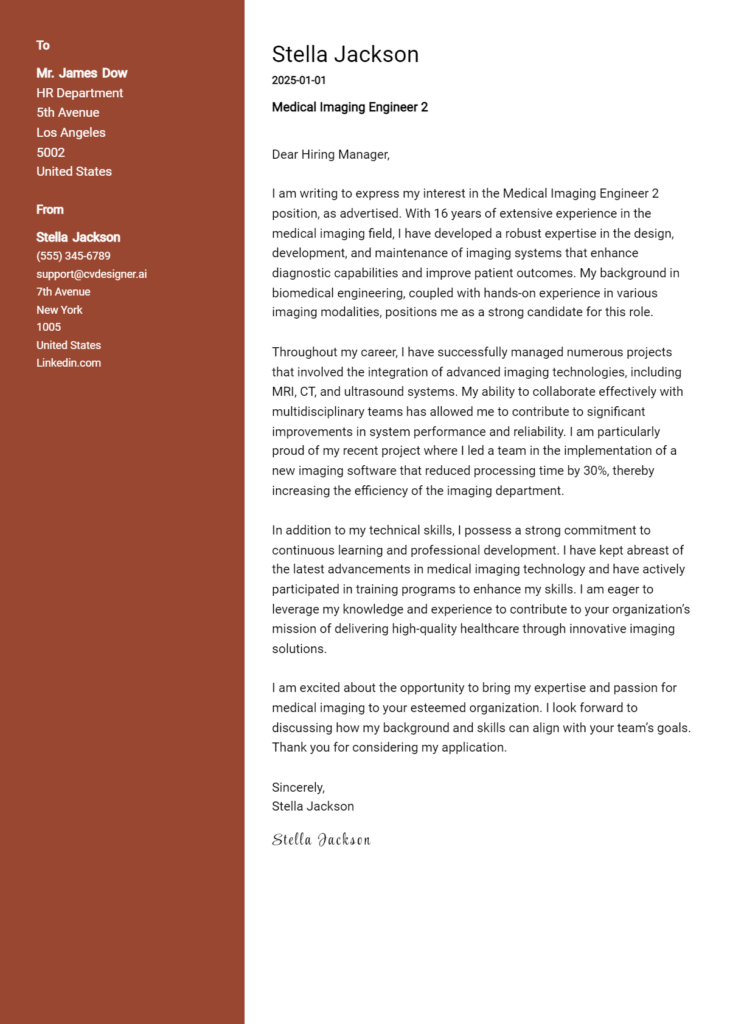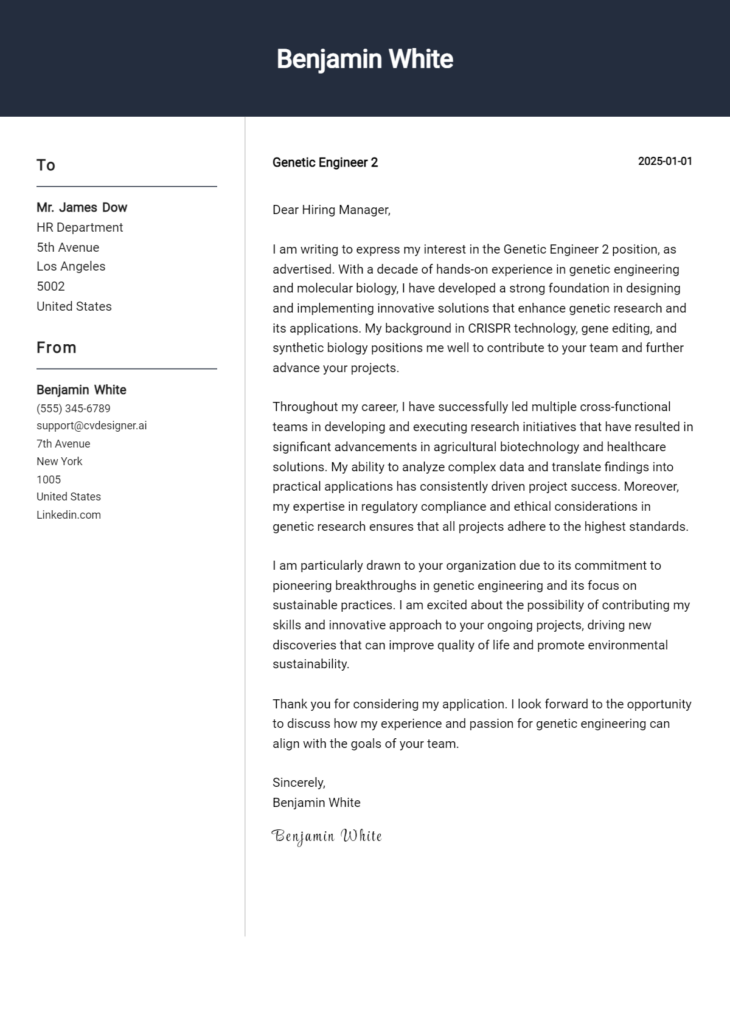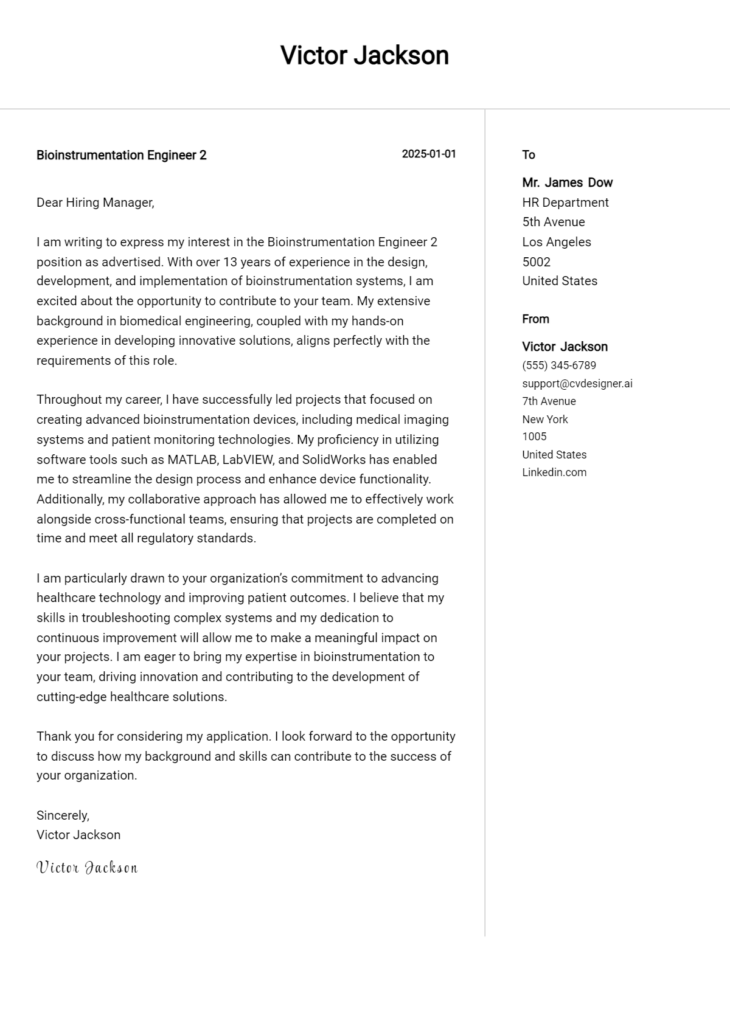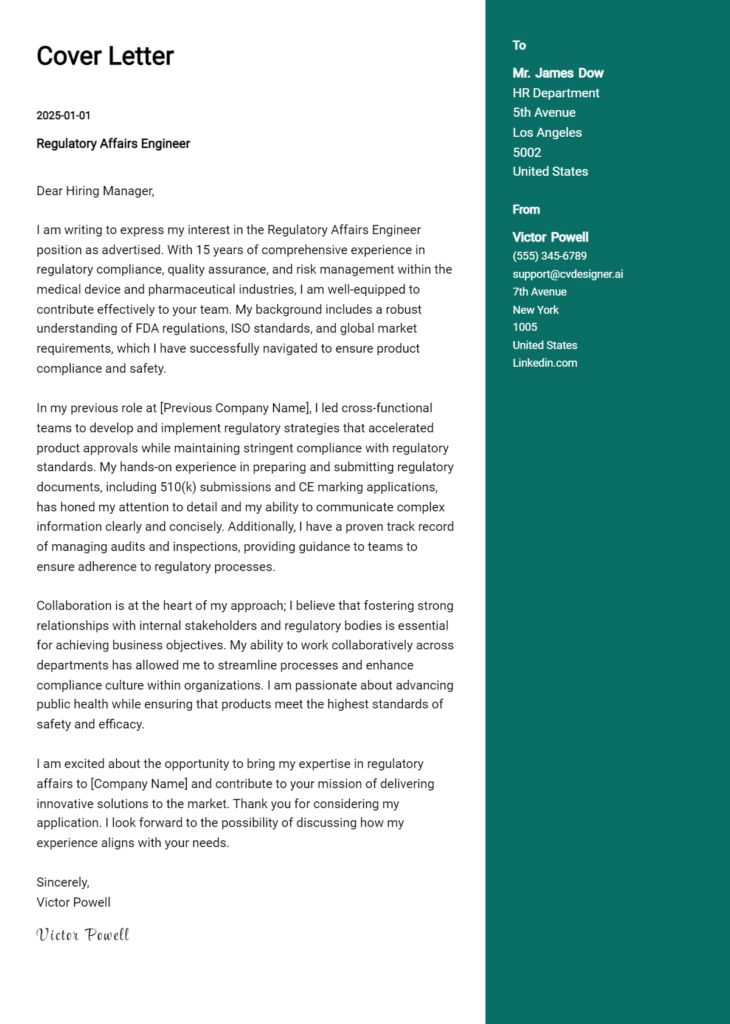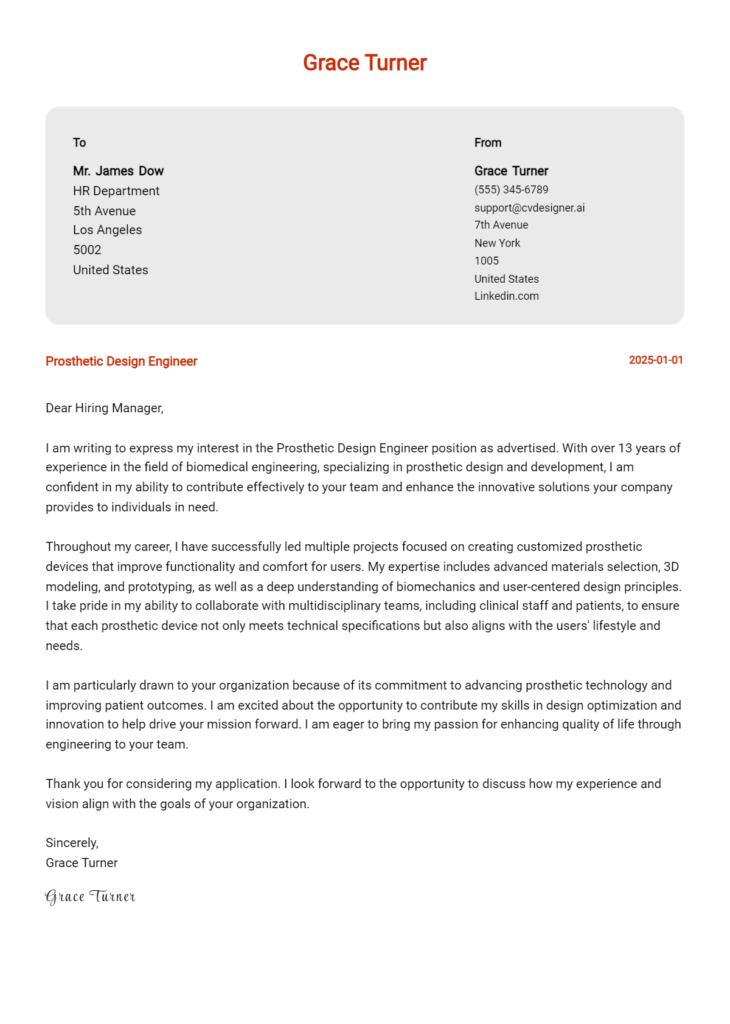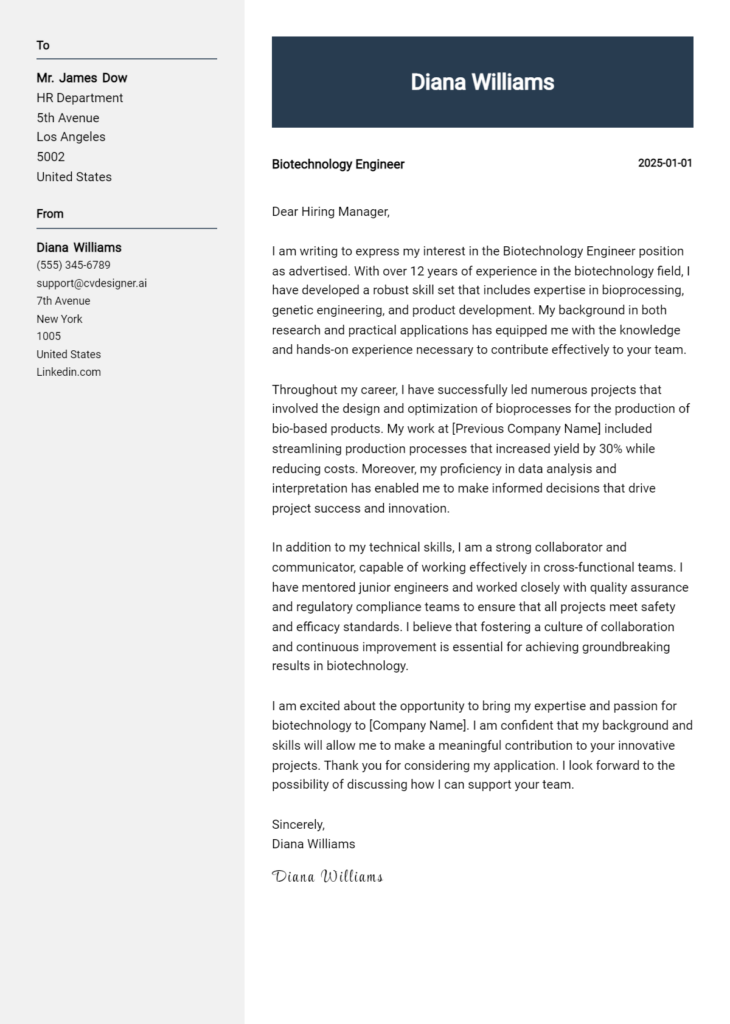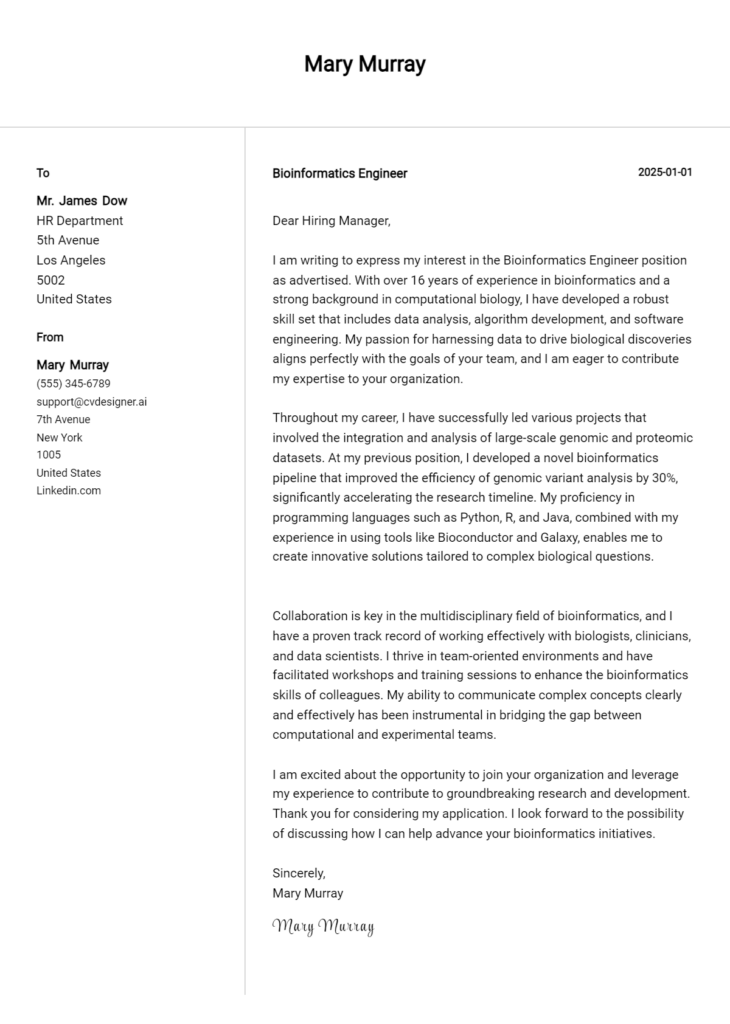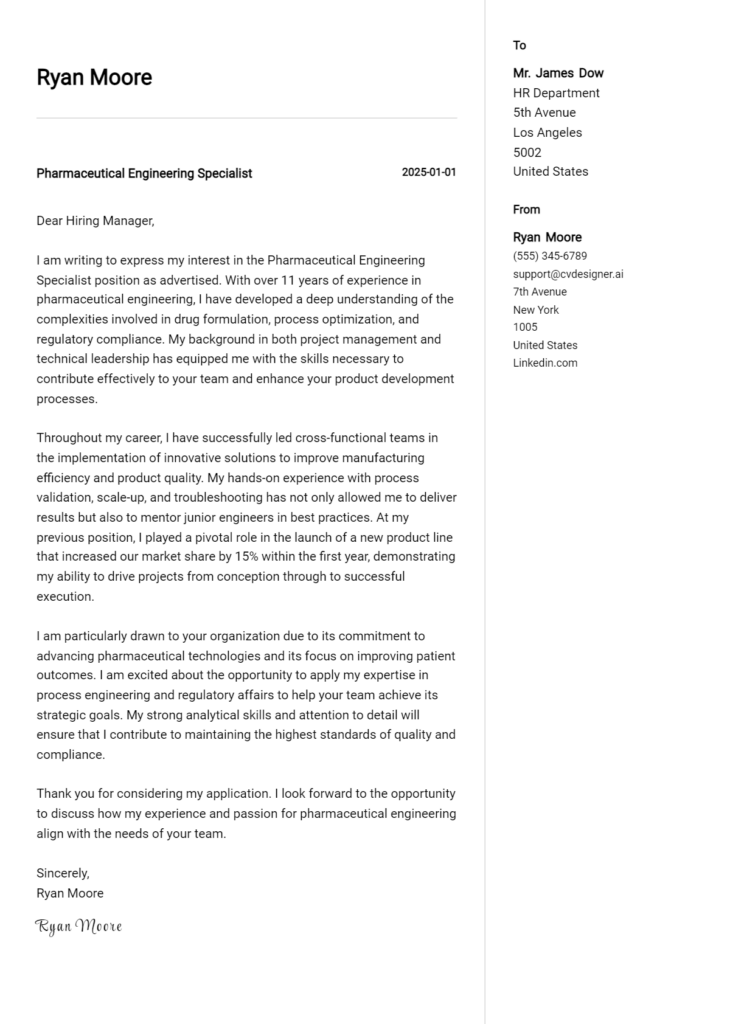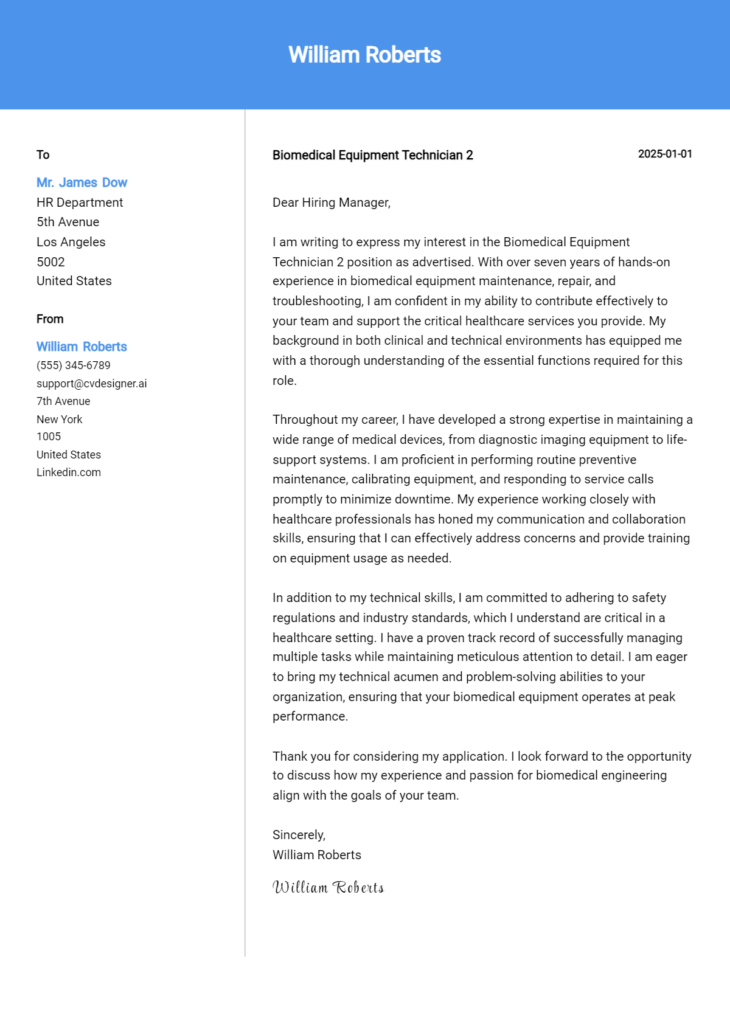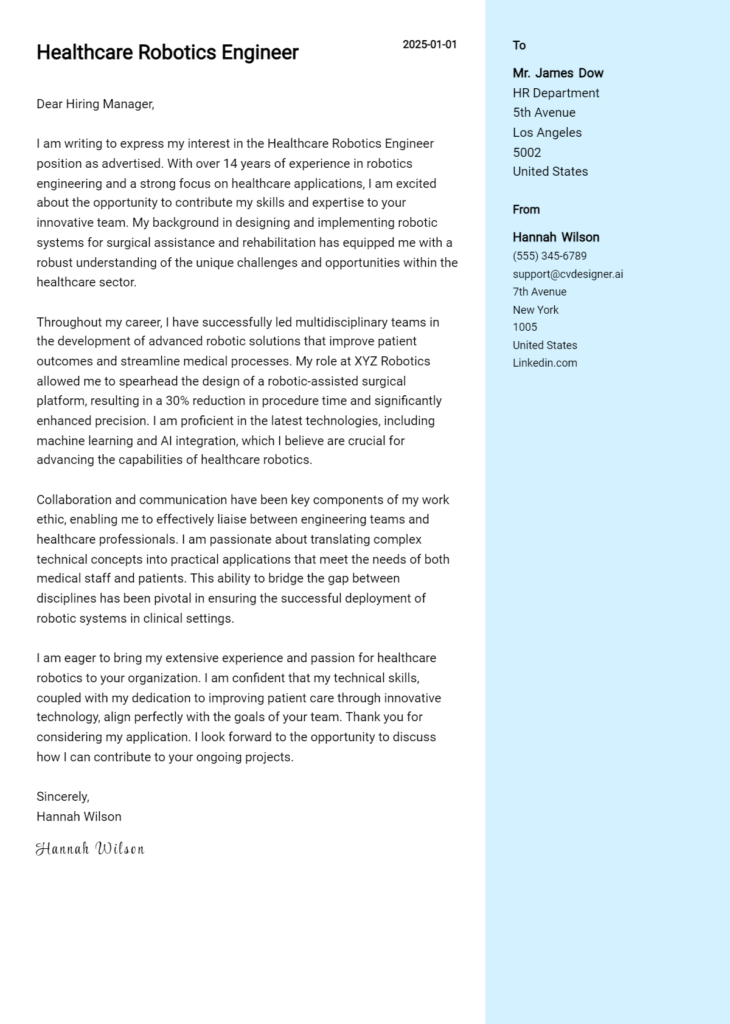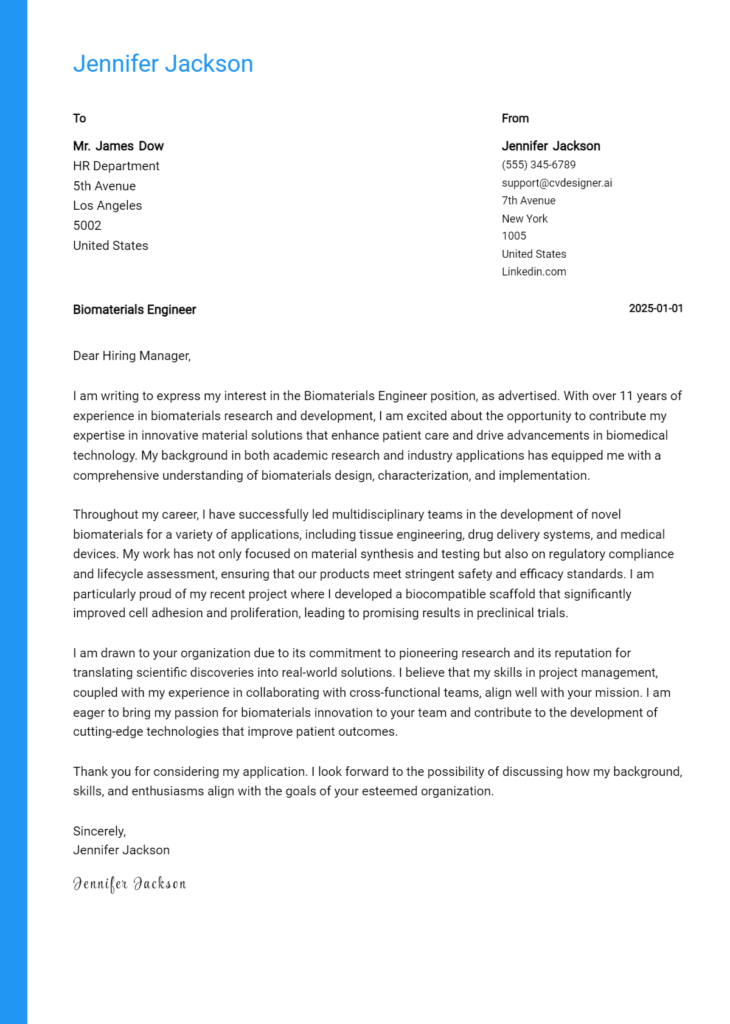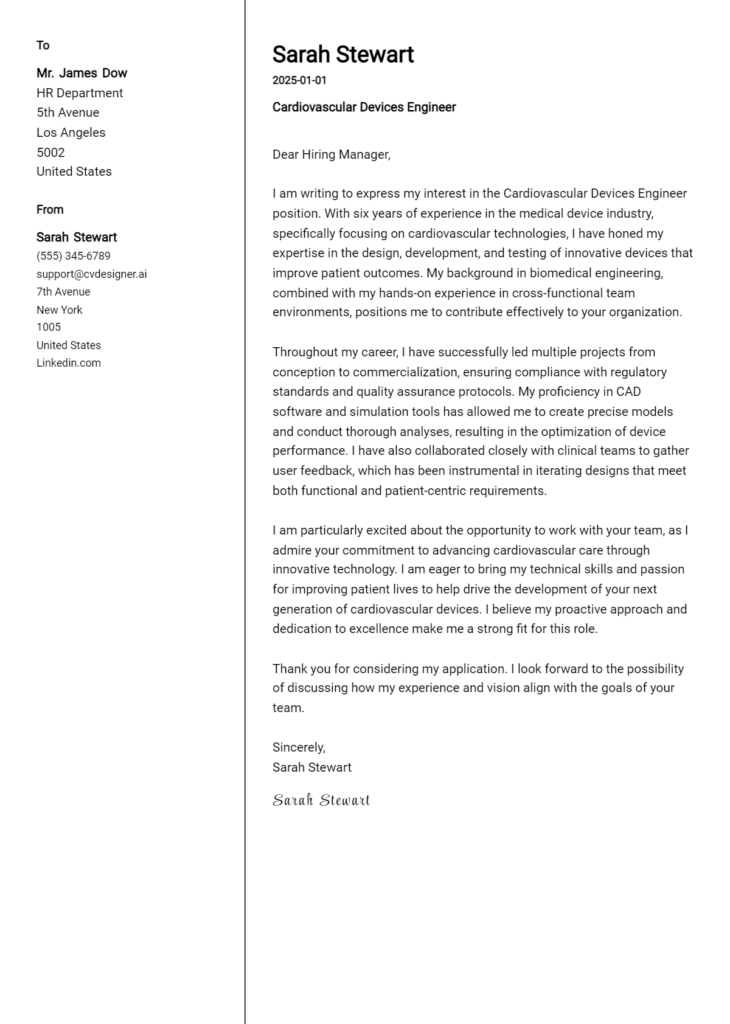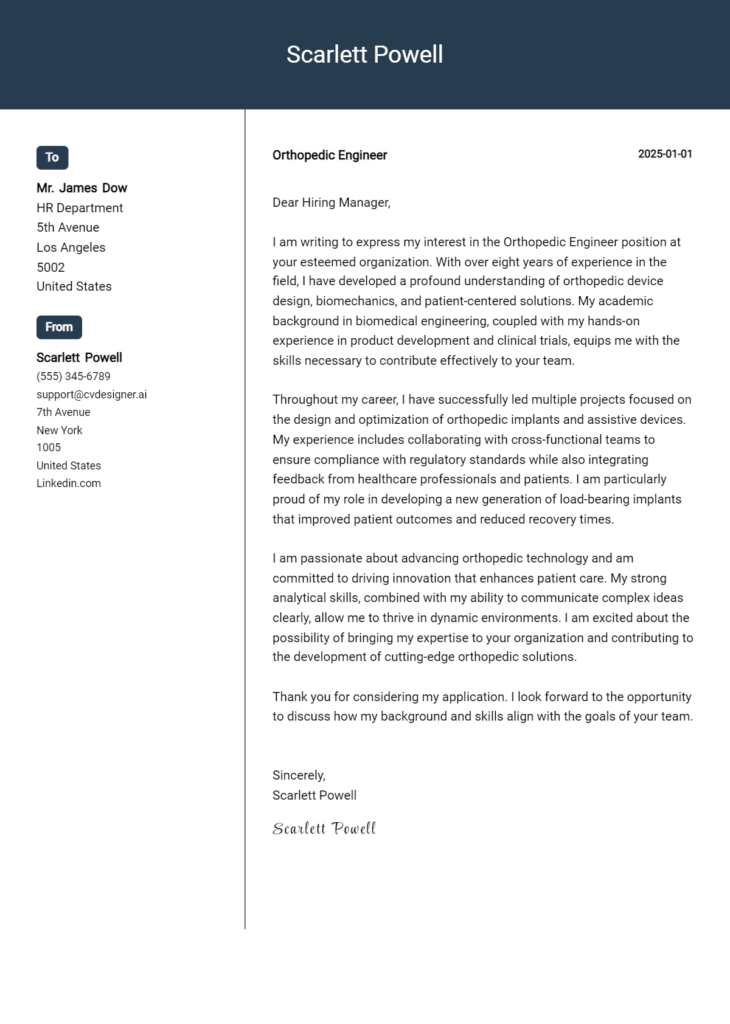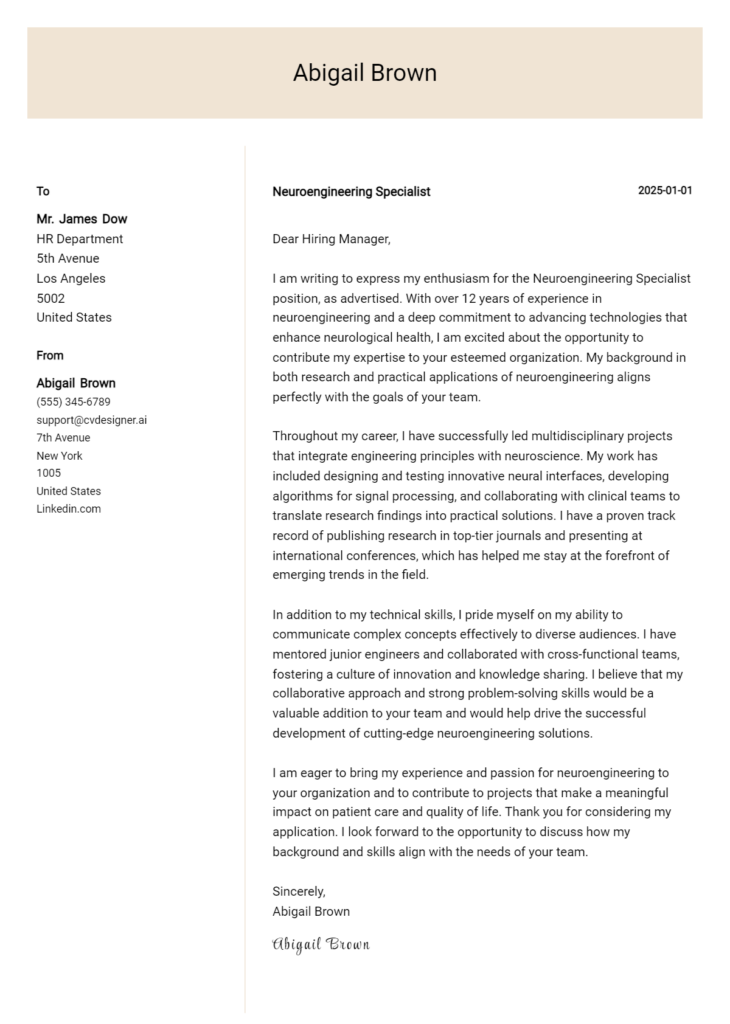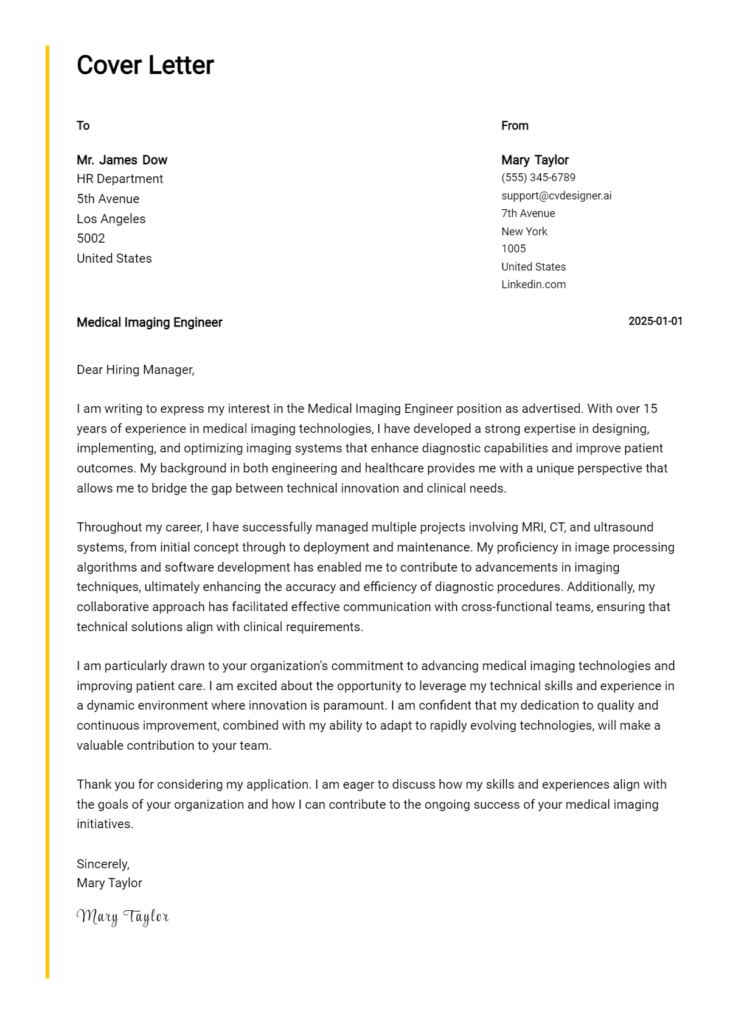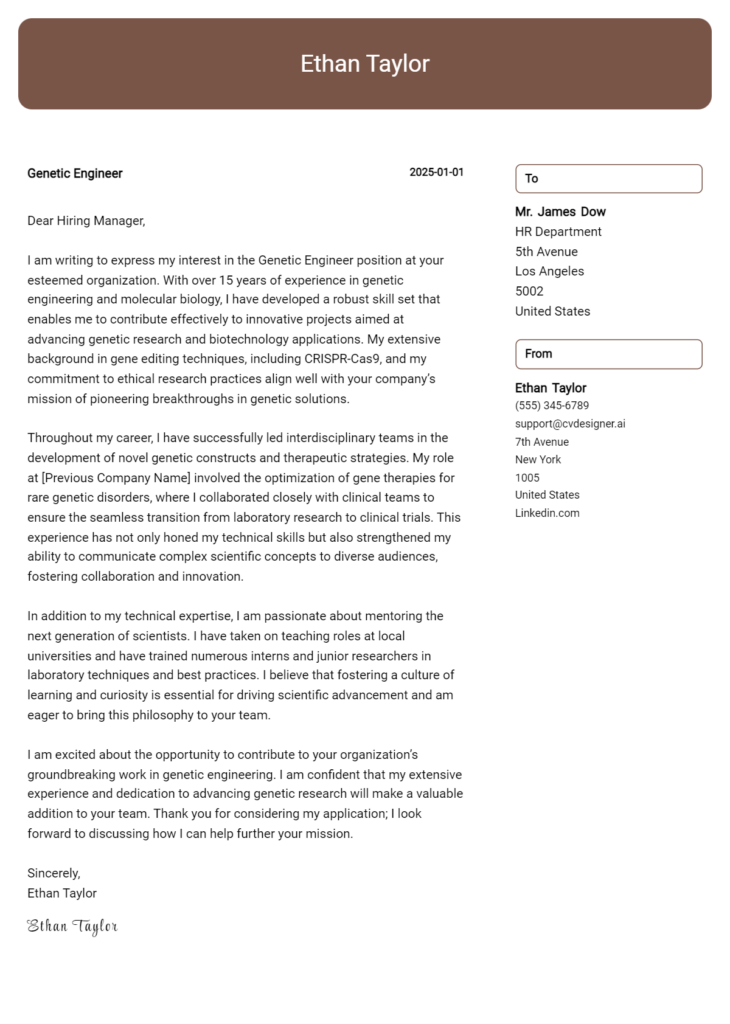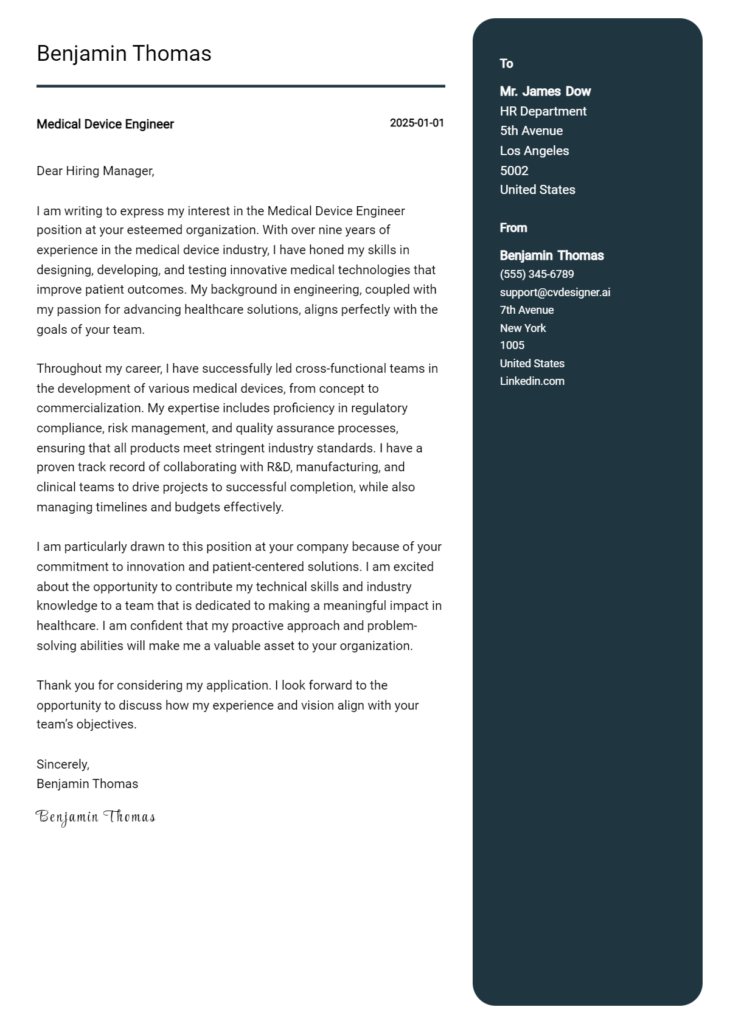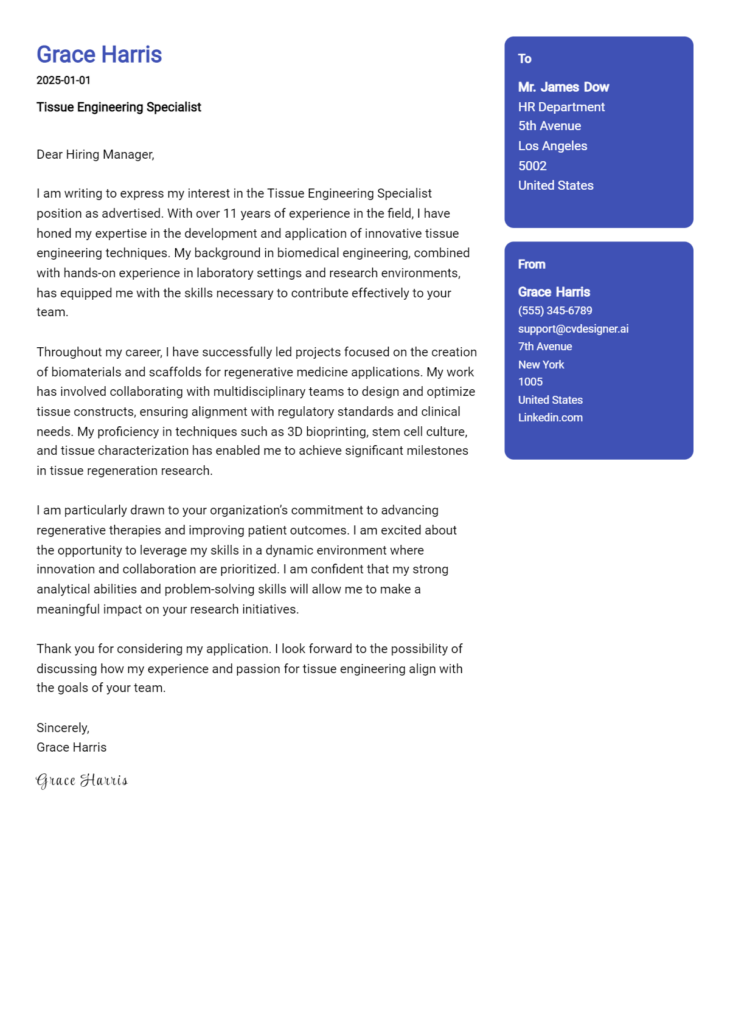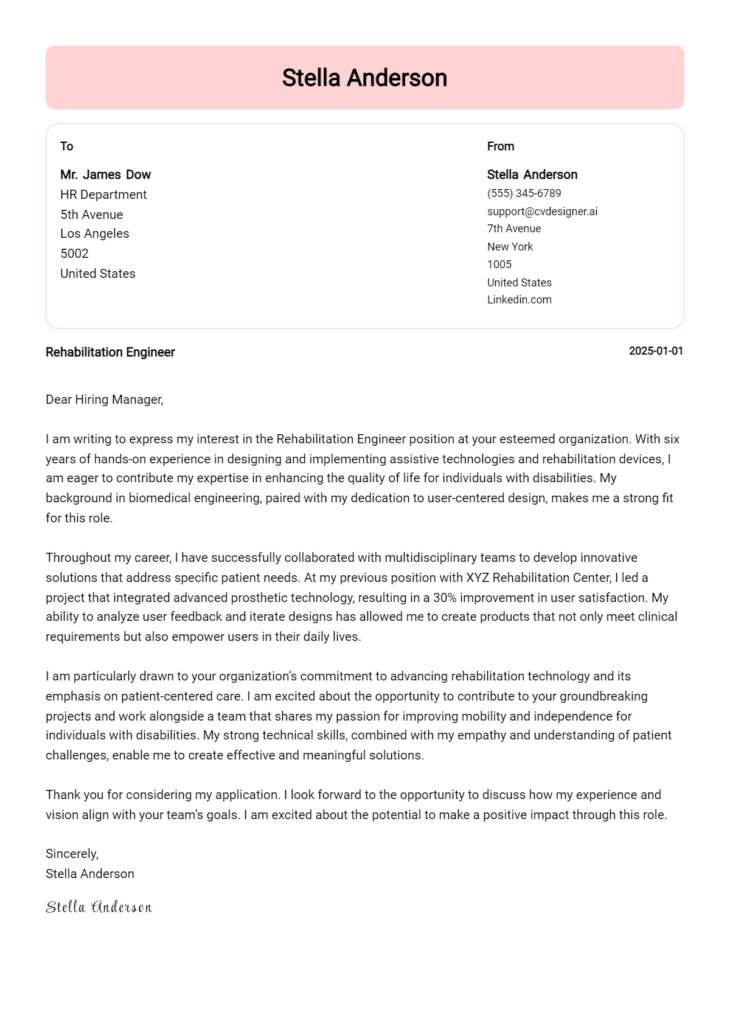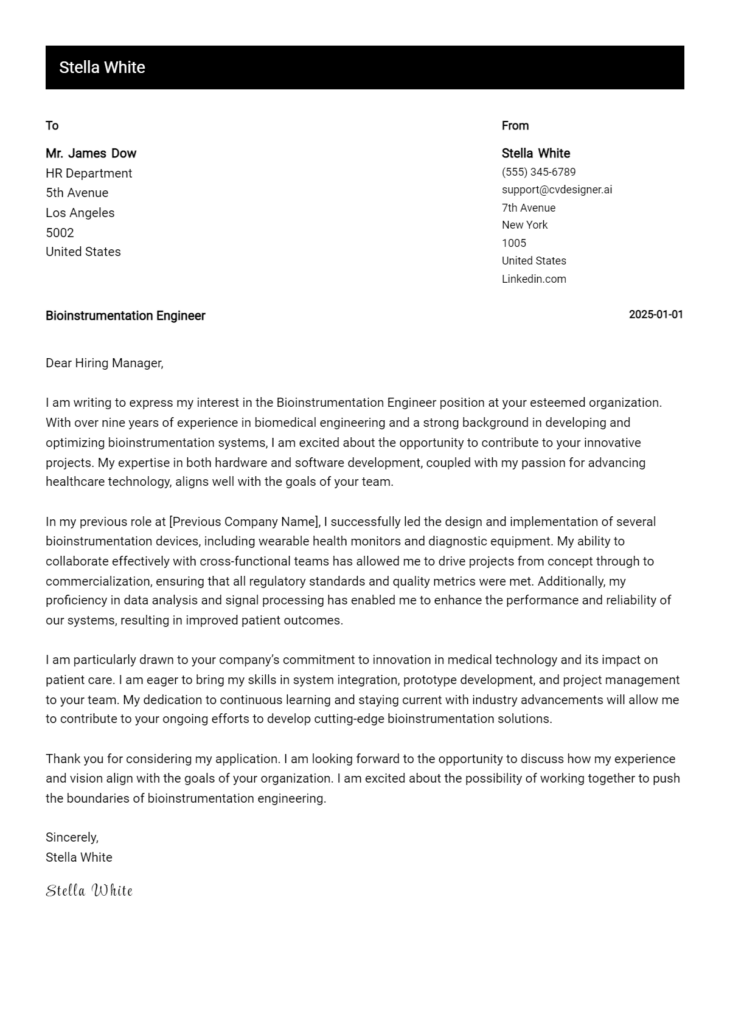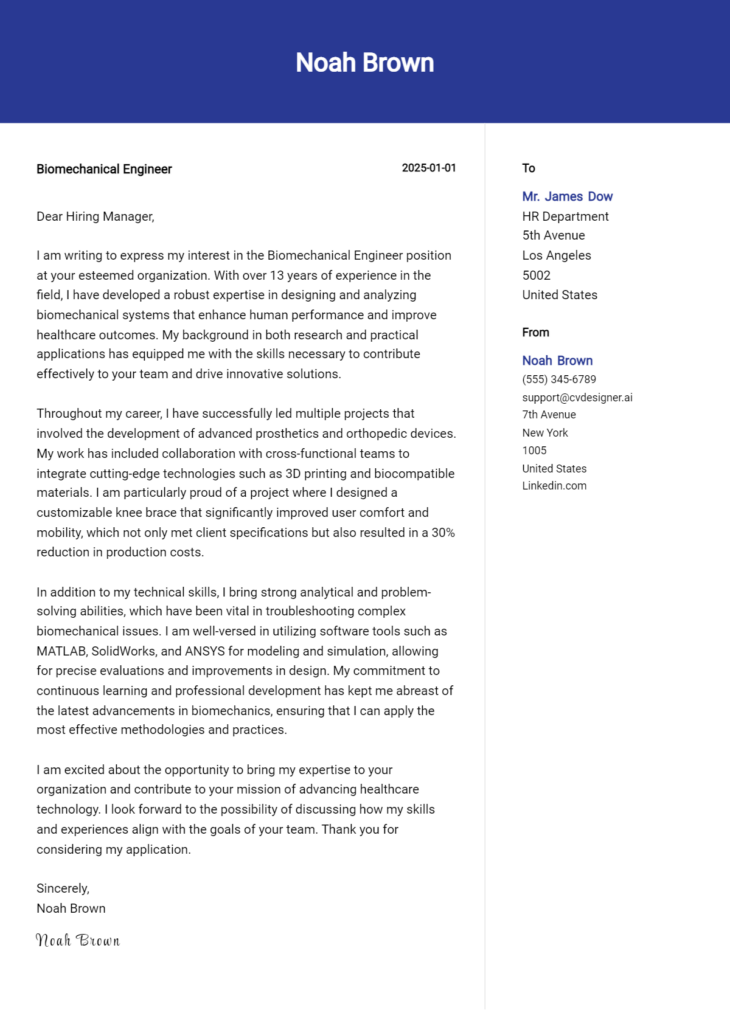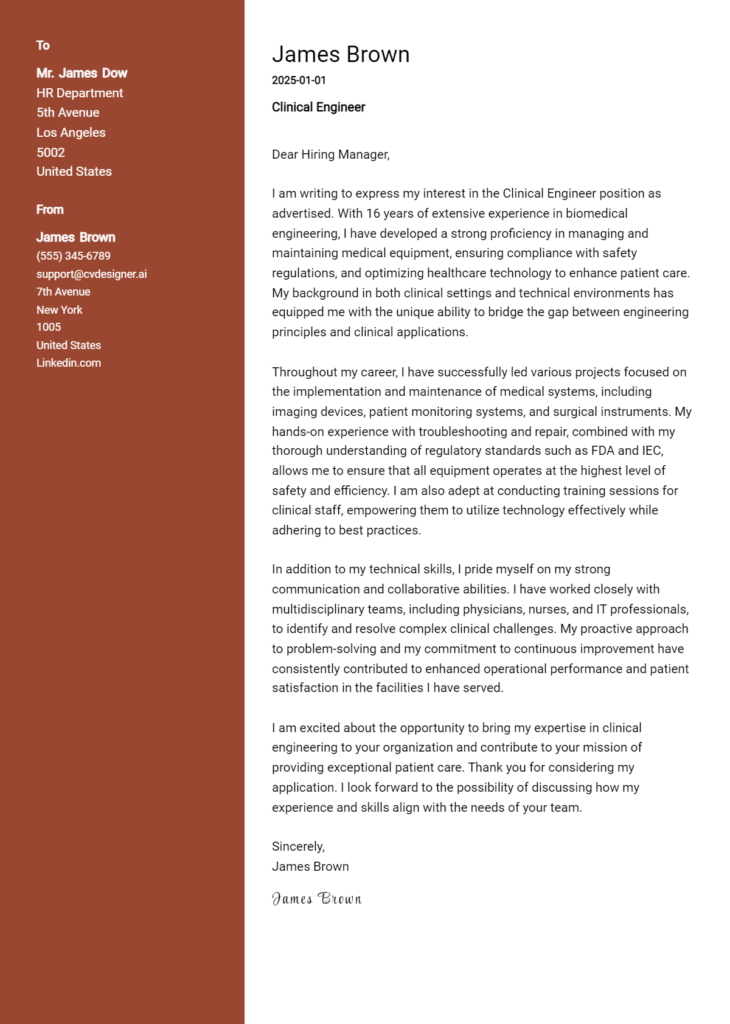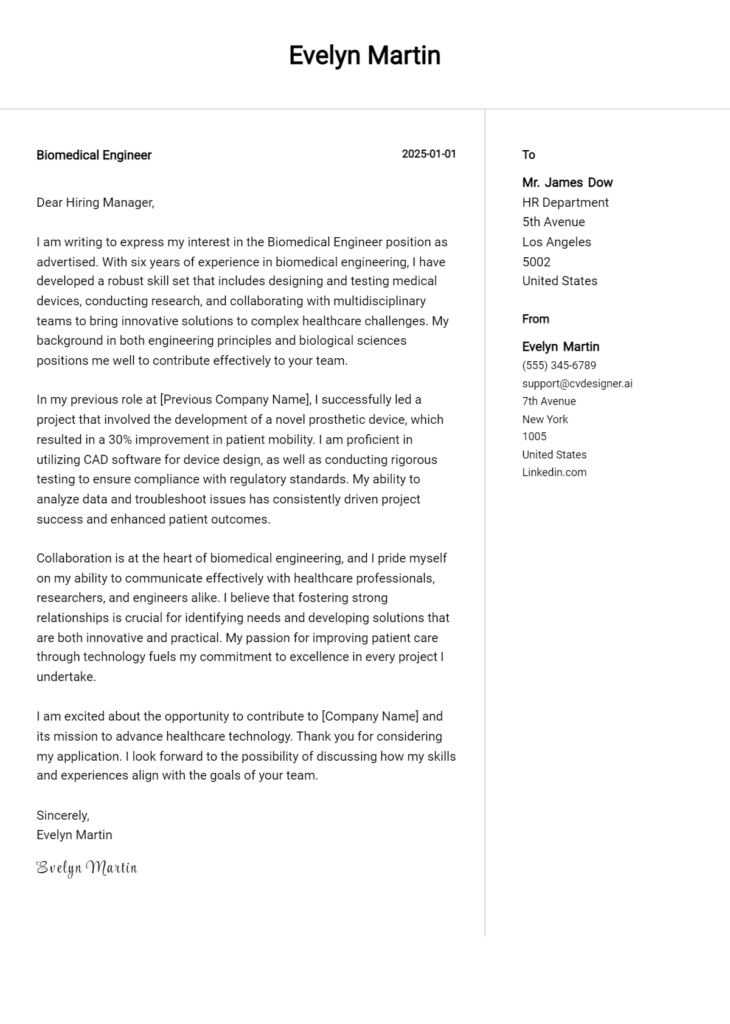Medical Device Engineer 2 Cover Letter Examples
Explore additional Medical Device Engineer 2 cover letter samples and guides and see what works for your level of experience or role.
How to Format a Medical Device Engineer Cover Letter?
Crafting a well-structured cover letter is essential for a Medical Device Engineer, as it not only communicates your qualifications but also reflects your engineering mindset and attention to detail. In a field where precision and innovation are paramount, how you present your skills can significantly influence a hiring manager's impression of your capabilities. A thoughtfully formatted cover letter showcases your professionalism and reinforces your commitment to quality—key attributes in the medical device industry.
In this guide, we'll explore the essential components of a compelling cover letter, including:
- Cover Letter Header
- Cover Letter Greeting
- Cover Letter Introduction
- Cover Letter Body
- Cover Letter Closing
Each section is crucial for emphasizing your qualifications and demonstrating your fit for the role. Let’s break down each part and discuss how to make your medical device engineering cover letter stand out.
Importance of the Cover Letter Header for a Medical Device Engineer
The header of a cover letter is a critical element that sets the tone for your application. It serves as your first impression, showcasing your professionalism and attention to detail—qualities essential for a Medical Device Engineer. A well-structured header should include your contact information, the date, and the recipient's details to ensure clarity and facilitate easy communication. An organized and clear header not only reflects your professionalism but also helps the hiring manager quickly identify your application and respond accordingly.
Strong Example
Jane Doe 123 Medical Lane Innovative City, CA 90210 jane.doe@email.com (123) 456-7890 October 3, 2023 Mr. John Smith Hiring Manager Innovative Medical Devices Inc. 456 Health St. Innovative City, CA 90210
Weak Example
jane doe email: jane.doe@email.com 10/3/23 To Whom It May Concern
The Importance of a Strong Cover Letter Greeting
The greeting of a cover letter serves as the first impression for potential employers and sets the tone for the rest of the letter. A well-crafted greeting not only demonstrates professionalism but also conveys a sense of personalization that can resonate with the hiring manager. By addressing the recipient directly, you show that you value their time and are genuinely interested in the position. To make a strong impact, avoid generic greetings such as "To Whom It May Concern" and take the time to research the hiring manager's name if it's available. This small effort can significantly enhance the connection you establish with the reader.
Strong Greeting Example
Dear Dr. Jane Smith,
Weak Greeting Example
To Whom It May Concern,
The Importance of a Strong Cover Letter Introduction for a Medical Device Engineer
A well-crafted cover letter introduction is crucial for a Medical Device Engineer as it serves as the first impression to the hiring manager. This initial paragraph must effectively capture attention, demonstrating the candidate's enthusiasm for the role while succinctly highlighting relevant skills and achievements. A strong introduction not only sets the tone for the rest of the letter but also provides context for why the candidate is a perfect fit for the position. Below are examples of both strong and weak cover letter introductions for a Medical Device Engineer position.
Strong Example
Dear [Hiring Manager's Name], As a dedicated Medical Device Engineer with over five years of experience in developing innovative healthcare solutions, I am excited to apply for the position at [Company Name]. My background in designing cutting-edge medical devices, coupled with a proven track record of successful project management, aligns perfectly with your team's mission to enhance patient care through technology. I am particularly proud of my role in launching a new cardiac monitoring device that improved patient outcomes by 30%, and I am eager to bring this expertise to [Company Name].
Weak Example
Hello, I saw the job posting for a Medical Device Engineer and thought it sounded interesting. I've worked in engineering for a few years, but I'm not sure if I have all the qualifications you're looking for. I think I would like to be a part of your company because it's well-known, and I hope you consider my application.
Cover Letter Body for Medical Device Engineer
The cover letter body serves as a critical component in presenting a Medical Device Engineer's qualifications, skills, and experiences to potential employers. This section allows candidates to articulate their relevant projects, highlight significant accomplishments, and demonstrate how their expertise aligns with the company's goals. A strong cover letter body not only showcases technical skills but also conveys the candidate's passion for innovation and commitment to enhancing patient care through effective medical device solutions.
Strong Example
Dear Hiring Manager, I am excited to apply for the Medical Device Engineer position at [Company Name]. In my previous role at [Previous Company], I led a cross-functional team to develop a novel cardiac monitoring device that reduced patient hospital stays by 30%. My hands-on experience with CAD software and proficiency in regulatory compliance allowed us to navigate the FDA approval process smoothly, ultimately resulting in a successful product launch. Additionally, my involvement in the design modifications based on user feedback significantly improved the device's functionality and user experience. I am eager to bring my expertise in medical device innovation to [Company Name] and contribute to your mission of advancing healthcare technology.
Weak Example
Dear Sir or Madam, I am applying for the Medical Device Engineer position. I have worked in engineering for a few years and have some experience with medical devices. I think I could be a good fit for your team. I have worked on some projects, but I can't share too many details. I am looking forward to possibly working with you and helping out with your products.
Importance of the Cover Letter Closing for a Medical Device Engineer
The closing paragraph of a cover letter is crucial for leaving a lasting impression on hiring managers. For a Medical Device Engineer, it should succinctly summarize your qualifications, reiterate your enthusiasm for the position, and encourage the reader to take the next steps, such as reviewing your resume or scheduling an interview. A strong closing can reinforce your fit for the role and demonstrate your proactive approach, while a weak closing may fail to convey your interest or urgency, leaving the reader unconvinced.
Strong Example
I am excited about the opportunity to contribute to your team at [Company Name] as a Medical Device Engineer. My background in biomedical engineering, coupled with my hands-on experience in product development and regulatory compliance, positions me well to make a meaningful impact. I look forward to discussing how I can leverage my skills to help drive innovative solutions at [Company Name]. Please find my resume attached for your review, and I would welcome the chance to schedule an interview at your earliest convenience. Thank you for considering my application.
Weak Example
I hope you find my application interesting. I think I might be a good fit for the position. Feel free to look at my resume. Thanks for reading this.
When applying for a position as a Medical Device Engineer, crafting a compelling cover letter is crucial to stand out in a competitive field. This document not only highlights your qualifications but also showcases your technical skills, problem-solving abilities, knowledge of the Software Development Life Cycle (SDLC), teamwork experience, and a passion for continuous learning. Here are some tips to help you create an effective cover letter that resonates with hiring managers.
Tips for Writing an Effective Cover Letter for Medical Device Engineer
Showcase Your Technical Skills
Clearly outline your technical expertise in medical device development. Mention specific software, tools, and methodologies you have used, such as CAD software for design or programming languages for device firmware. Tailor your skills to align with the job description, demonstrating that you have the necessary qualifications to excel in the role.Highlight Problem-Solving Abilities
Provide examples of challenges you have faced in previous projects and the innovative solutions you implemented. Describe how your analytical skills led to successful outcomes, particularly in product development or regulatory compliance. This not only demonstrates your problem-solving prowess but also your ability to think critically under pressure.Emphasize Knowledge of SDLC
Discuss your understanding and experience with the Software Development Life Cycle (SDLC) as it pertains to medical devices. Explain how you have contributed to different phases of the SDLC, from requirements gathering to testing and deployment. This shows your comprehensive knowledge of the engineering process and your ability to manage projects effectively.Show Your Teamwork Experience
Collaborating with cross-functional teams is essential in medical device engineering. Highlight your experience working with various stakeholders, such as design teams, quality assurance, and regulatory bodies. Discuss how you facilitated communication and collaboration to achieve project goals, showcasing your interpersonal skills and ability to work in a team-oriented environment.Demonstrate a Passion for Continuous Learning
The medical device industry is constantly evolving, and a commitment to professional development is essential. Share any relevant certifications, courses, or workshops you have completed. Mention your enthusiasm for staying updated with industry trends and advancements, which demonstrates your dedication to improving your skills and contributing to innovative solutions.
By integrating these tips into your cover letter, you can effectively communicate your qualifications and passion for the role. For further assistance, you can explore cover letter templates or use a cover letter builder to create a polished and professional document.
Common Mistakes to Avoid in a Medical Device Engineer Cover Letter
Crafting an effective cover letter is essential for standing out in the competitive field of medical device engineering. Avoiding common mistakes can significantly enhance your chances of landing an interview. Here are some pitfalls to watch out for:
Generic Content: Sending a one-size-fits-all cover letter is a major mistake. Tailor your letter to the specific position and company. Research the organization and mention how your skills align with their mission and values.
Lack of Specific Examples: Failing to provide concrete examples of your achievements can weaken your application. Include specific projects or innovations you've contributed to that demonstrate your expertise in medical device engineering.
Ignoring Formatting Guidelines: A poorly formatted cover letter can detract from your message. Ensure you follow a professional cover letter format that enhances readability and presents your information clearly.
Grammatical Errors: Typos and grammatical mistakes can create a negative impression. Always proofread your cover letter or ask someone else to review it for clarity and correctness.
Overly Technical Language: While it’s important to showcase your technical knowledge, avoid jargon that might confuse the reader. Aim for a balance between technical detail and accessibility.
Neglecting the Closing: A weak or absent closing statement can leave a poor impression. Always end with a strong conclusion that reiterates your enthusiasm for the role and invites further discussion.
Failing to Mention Relevant Skills: Not highlighting skills that are crucial for the position is a missed opportunity. Review the job description carefully and ensure your cover letter addresses these key qualifications, using relevant cover letter examples for guidance.
By steering clear of these common mistakes, you can create a compelling cover letter that effectively showcases your qualifications and enthusiasm for the role of a Medical Device Engineer.
Cover Letter FAQs for Medical Device Engineer
What should I include in my cover letter for a Medical Device Engineer position?
In your cover letter, highlight your relevant experience in the medical device industry, including any specific projects or products you’ve worked on. Mention your technical skills, such as proficiency in CAD software, prototyping, and regulatory knowledge (e.g., FDA regulations). It’s also crucial to include soft skills that are important in engineering, like teamwork, communication, and problem-solving abilities. Tailor your letter to the specific job description by incorporating keywords from the posting. Finally, express your passion for improving patient outcomes through innovative medical devices, which aligns with the company’s mission.
How do I demonstrate my technical skills in my cover letter?
To effectively demonstrate your technical skills, include specific examples of projects where you applied these skills. For instance, describe a particular medical device you helped develop, detailing your role in the design, testing, or regulatory approval processes. Use metrics and outcomes to quantify your impact, such as reduced costs, improved performance, or successful compliance with health regulations. Additionally, mention any certifications or training you have received that is relevant to the position, such as Six Sigma or ISO 13485. This not only showcases your expertise but also your commitment to the field.
How long should my cover letter be for a Medical Device Engineer position?
Your cover letter should ideally be one page long, typically around three to four paragraphs. Start with a strong introduction that captures the hiring manager's attention, followed by a brief overview of your relevant experience and skills. Use the body of the letter to elaborate on specific accomplishments and how they relate to the position you are applying for. Conclude with a compelling closing statement that reiterates your enthusiasm for the role and invites further discussion. Keeping it concise ensures that you respect the reader’s time while effectively conveying your qualifications.
Should I customize my cover letter for each job application?
Absolutely! Customizing your cover letter for each job application is essential. It demonstrates your genuine interest in the specific position and company. Research the organization to understand its values, mission, and recent projects. Incorporate this information into your letter to illustrate how your goals align with theirs. Additionally, reference the specific job title and highlight the skills and experiences that directly relate to the job description. This tailored approach not only makes your application stand out but also increases your chances of being noticed by hiring managers.
Build your Cover Letter in minutes
Use an AI-powered cover letter builder and have your letter done in 5 minutes. Just select your template and our software will guide you through the process.

